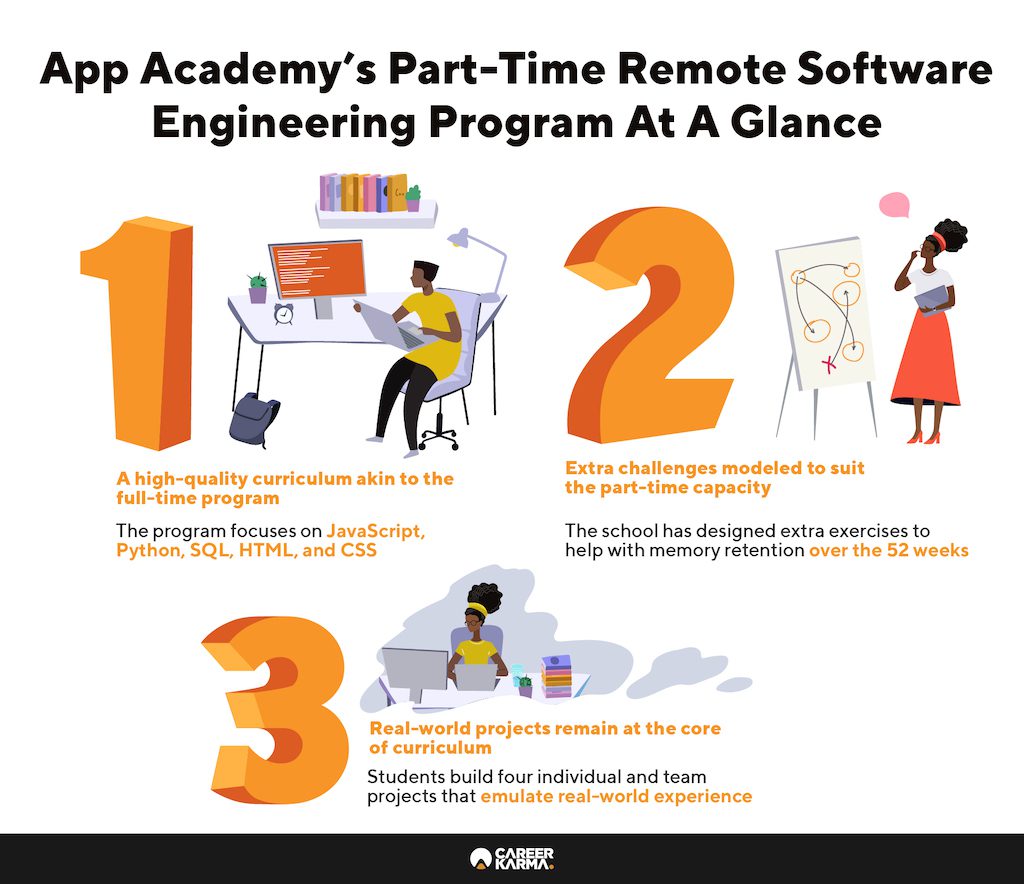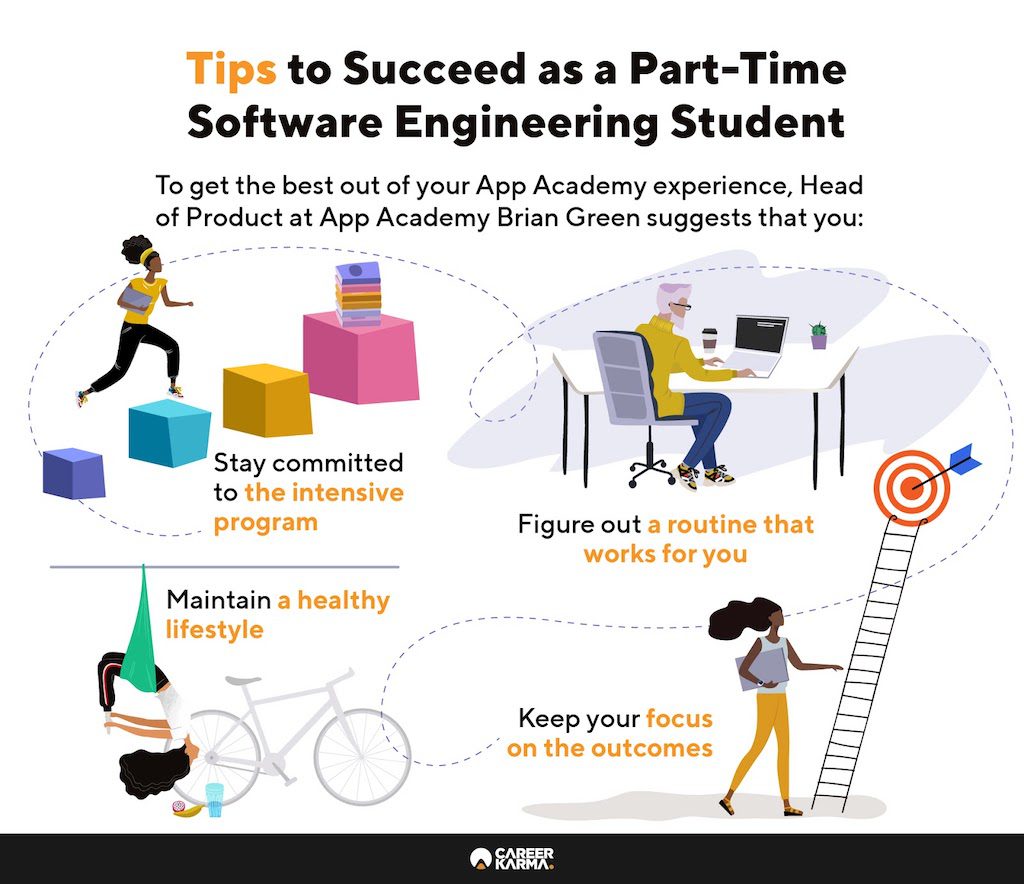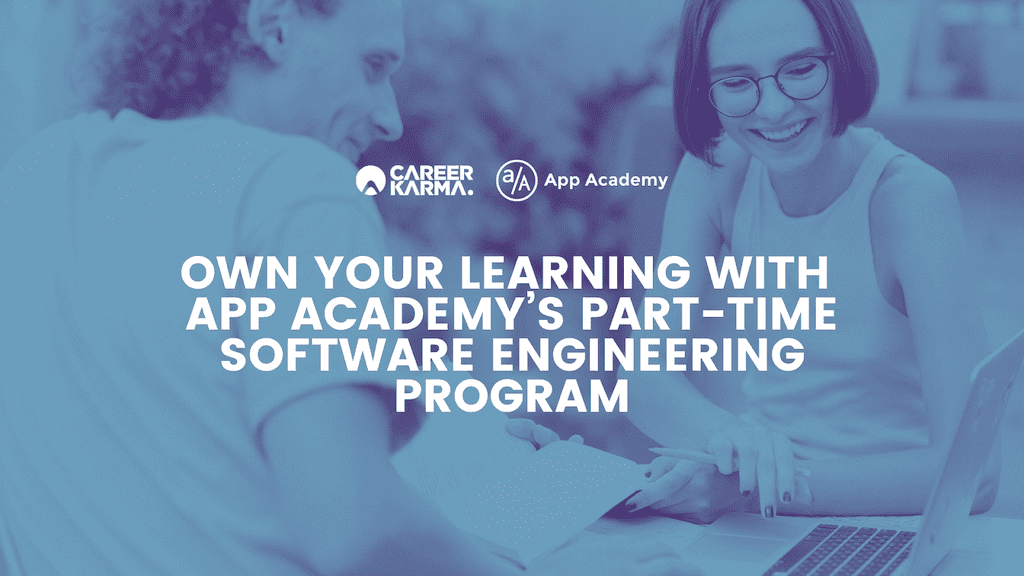College is for the young. Since its inception, the traditional college model has catered to the needs of bright-eyed young adults fresh out of high school, leaving those who don’t fit this profile in the dust.
For these non-traditional students, coding bootcamp App Academy offers a more flexible approach to learning: the Part-Time Software Engineering Immersive, a program specifically designed to meet the needs of every adult learner.
Over 25 Is the New 18: Reimagining Today’s Students
Student bodies are becoming less traditional, yet the education they receive remains stubbornly conventional. Higher Learning Advocates reports that nearly half of the college student population are over the age of 25. Twenty-six percent are parents, while 58 percent blend work with school.
Despite their increasing visibility, they stay overlooked by a learning system that continues to hold on to the idea of full-time academic pursuits. This rings true for around 51 percent of students who, according to the National Student Clearinghouse Research Center, entered college part-time in 2013 but failed to earn a bachelor’s degree after six years due to their life circumstances.
To address this issue, more and more have called for inclusivity.
Yet to say that nontraditional students need inclusion is almost a redundancy. “In the most literal sense, they are included: already present but often invisible in public universities, already visible but often under-resourced in community colleges…They are included in ways that set them aside or set them up for failure,” writes academic leader David Scobey.
App Academy puts forward an alternative prescription: a program that not only recognizes these learners but also puts forward a curriculum made especially for them.

What to Expect from App Academy’s Part-Time Remote Software Engineering Program
The nontraditional student population is incredibly diverse. Put in a classroom, you’ll meet the mom of three, the immigrant who’s working three jobs, the college dropout looking for another chance to succeed, and the 40-year-old professional who wants to pursue the career he’s always dreamt of.
App Academy’s Part-time Remote Software Engineering Immersive was designed to give these people more room to fit their studies around the demands of their other obligations and current circumstances. The goal is that by doing so, they’ll have a better chance at earning the skills they need to get their foot into the tech industry.
The program is nearly identical to App Academy’s Full-time Software Engineering Immersive, with two major differences. First, it adopts a more flexible academic calendar and therefore takes longer to complete. Instead of 24 weeks, you’ll complete your training in 52 weeks. Second, it increases access for students who otherwise don’t have the means to learn full time.
“A full-time coding bootcamp is 100 percent of your life,” says Brian Green, Head of Product at App Academy. “It’s full time from the moment you wake up until you go to sleep for four months, six months, or however long it takes you to graduate─followed by a full-time grind to find a job.”
“It can be 12 to 18 months of full-time dedication to make the transition. Not everyone can do that, purely logistically. Not everyone can put their life on hold to learn full time.” The part-time program, says Brian, “meets these students where they’re at, with a highly effective learning that fits into your life.”
Despite the differences, Brian assures that students who enroll in the part-time program will still be privy to the same kinds of high-quality learning opportunities that full-time students get: hands-on learning, capstone projects, career services, a strong support system, and more.
The Curriculum
Modeled after its full-time counterpart, App Academy’s Part-time Remote Software Engineering Immersive likewise focuses on JavaScript, Python, SQL, HTML, and CSS programming. With the same topics covered, the part-time program also promises the same outcomes: to transform you into a full stack software engineer.
“[That said] the part-time experience will include some activities specially designed to make the program more effective,” says Brian. “Students will spend roughly twice as long in the program, so there’s a need for a different cadence of spaced repetition to make sure students develop a deep understanding of the material.”
This means additional programming challenges and exercises to make learning more memorable despite the longer program length. “[The] assessments are tough but fair,” says Brian. “We’re checking for a deep enough level of understanding to progress to more challenging material.”
Learning remains project-based. Throughout the part-time program, students are challenged to build four real-world portfolio projects that include individual and team-based endeavors. By exposing them to these environments, they can become autonomous yet collaborative software engineers.
“We also give students a choice of scenarios for their projects, so there’s a chance to be creative and make the projects personal,” says Brian, who says students later present these projects to the class to practice their technical communication skills. “We want them to be confident with talking about their code when interviewing with potential employers.”
Learn in-demand skills like JavaScript, Python, SQL, HTML, and CSS with App Academy’s Part-Time Software Engineering program.
Apply to App Academy today.A Day in the Life of an App Academy Part-Time Remote Software Engineering Student
Flexibility lies at the heart of this program. As a part-time online software engineering student, you’ll have the option to choose between two time zones: Eastern and Pacific. Whichever you choose, classes run for three hours from Monday through Thursday and for six hours on Saturday (including lunch break).
Mondays are usually reserved for assessments, where students review the previous week’s material. Students are then introduced to new concepts along with hands-on activities on Tuesdays through Thursdays.
“We’re using a flipped-classroom approach, so students will learn new material through our learning management system before coming to class,” explains Brian. “Class time will be less focused on lectures and more about Q&A sessions with instructors to make sure everyone understands the material, along with a heavy emphasis on hands-on practice through pair programming.”
Fridays are no-class days, allowing students to complete homework assignments as well as seek one-on-one assistance from App Academy’s instructional team if needed. Finally, Saturdays involve more time to practice the new skills students learned throughout the week and prepare for the following Monday’s assessment.
In total, you’ll be looking at an 18-hour in-class commitment and another nine hours to review course materials and complete homework assignments.
“We set out from the very start to make the program schedule and workload predictable,” says Brian. “We talked with prospective students to understand typical schedules, obligations outside of work, and general preferences for learning…to get a realistic picture of how long they can dedicate to learning.”
“Two themes we heard time and again were the need to make the schedule predictable and to not water down the experience. We treated these as immovable variables when we set out to design the learning experience. We also heard that time during the week is more limited than weekend time. So we structured the course with some evening sessions and a long weekend session.”
Brian adds, “If students need more time to develop deep skill mastery, they can stay at the same weekly pace and repeat the necessary modules.”
App Academy’s Part-Time Remote Software Engineering Immersive training structure is not just market-led, it’s also student-centric. This way, you don’t have to go out of your way to adjust to the demands of the program, on top of your other responsibilities. The program is already built around your needs.
Your Support System
You get three-tier support once you enroll in App Academy’s part-time program provided by the instructional team, student success team, and mental health professional.
“Our instructional staff will have office hours and support hours at different times during the week and over the weekend,” says Brian. “We have a strong roster of experienced teachers in the program, and our academic leadership has over 50 years of combined experience in adult learning.”
The student success team, meanwhile, takes on the responsibility of making sure that students are on track with their studies and professional goals.
“Their support is non-technical,” notes Brian, “so it’s more about advising students on study strategies, connecting them with resources, and building a community so students receive well-rounded support from staff and peers. This team works on a flexible schedule to be available to meet with students.”
The student success team counsels the students on how best to manage their studies should they deal with a major work or family crisis. “In some cases, if a student has to miss several consecutive class sessions, deferring to the next cohort might be the best option,” he says, adding that students are given 10 absences throughout the program—no questions asked but with the expectation that they’ll complete their coursework.
Learning is not just an intellectual journey.
Adult learners, especially, tend to focus too much on training for the job they need that they neglect their emotional and psychological well-being. For this reason, App Academy has a mental health professional on board who helps the school develop initiatives meant to tackle the stresses of the bootcamp environment.
Aside from this support system, students of the part-time program also get “open time” every other week. You have complete freedom to do what you want during this time. For instance, you could use it to catch up with the coursework, socialize with your classmates, or simply take a break to prevent risks of burnout.
“In addition to several federal holidays off throughout the year, we’re adding three one-week-long breaks into the schedule so students and our staff can take holidays to recharge and spend time with family. These breaks are spread throughout the year—spring break, summer break around July 4, and winter break around Christmas and New Year,” says Brian.
“Again, we’re trying to fit the program into the students’ lives, so we chose times when people may want to take some time off of work or, for parents in our program, when school is on break for their kids.”
Tips to Succeed as a Part-Time Software Engineering Student

To upskill in tech without quitting your day job or compromising other commitments is a tall order for some. App Academy eases the challenges they face by offering a program that anticipates their needs and meets them where they’re at. Of course, with the expectation that students will meet the school halfway. For prospective part-time students, Brian offers the following tips.
Stay Committed
“Even though the weekly schedule is less intensive than the full-time program, the program will be intense. It still requires set hours where you have to be learning and participating. This isn’t an asynchronous program and it’s not the kind where you can pause and come back.”
“It will be an intensive program, but students who commit will graduate and will launch a software engineering career.”
Figure Out a Routine
“The time commitment of the program may not seem like a lot on paper, but when you’re balancing everything in your life, squeezing in an hour to learn the day’s material can be tough.”
“As part of our admissions process, students have to complete a set of learning challenges. My recommendation is to start working on these learning challenges using the part-time schedule. That way, you have a chance to try out the schedule and make sure it works for you.”
Maintain a Healthy Lifestyle
“Obviously, balancing work and studying requires some sacrifice. But we highly recommend making time for eating right and exercising regularly.”
Stay Focused on the Outcome
“I’ve talked with a lot of students who feel pressure to finish within a certain time frame. ‘I’ll grind it out for a year and then it’ll be over,’ they say. Yes, you need to grind it out, but our program is designed to help you develop mastery, even if that means taking longer and repeating sections of the course.”
“The mastery-based learning approach is designed to ensure students graduate ready to excel in an engineering role. And we’ve seen evidence that students who defer cohorts to repeat sections of the course still find jobs at the same pace as students who don’t defer at all in the program.”
Own Your Learning with App Academy
App Academy’s Part-time Remote Software Engineering Immersive zeroes in on the needs of learners who fall beyond the pop-cultural archetype of a postsecondary student. It’s for the moms, the dads, the working professionals, and all other learners who simply can’t afford to become full-time students.
If you belong in any of these groups and are looking to get into the tech industry with better success, sign up for App Academy’s part-time program and start learning on your terms.
About us: Career Karma is a platform designed to help job seekers find, research, and connect with job training programs to advance their careers. Learn about the CK publication.




